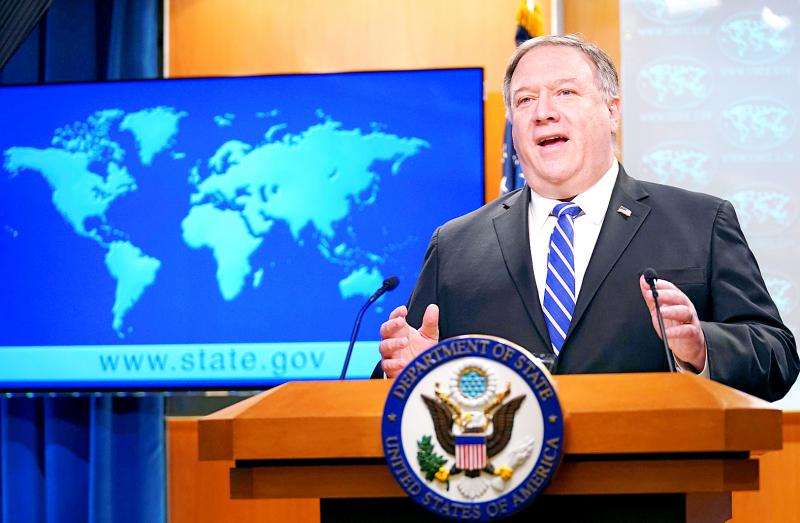US Secretary of State Mike Pompeo on Wednesday urged WHO Director-General Tedros Adhanom Ghebreyesus to invite Taiwan to this month’s World Health Assembly (WHA) as an observer, prompting the Ministry of Foreign Affairs to thank the US for its steadfast support.
During a news briefing at the White House, Pompeo called on all nations to support Taiwan’s bid to join the annual assembly, which is expected to begin on May 18.
“Today I want to call upon all nations, including those in Europe, to support Taiwan’s participation as an observer at the World Health Assembly and in other relevant United Nations venues. I also call upon WHO Director-General Tedros to invite Taiwan to observe this month’s WHA, as he has the power to do, and as his predecessors have done on multiple occasions,” Pompeo said.

Photo: Reuters
Taiwan participated in the WHA as an observer from 2009 to 2016, but has not been invited since President Tsai Ing-wen (蔡英文) took office on May 20, 2016.
Pompeo made the remarks after he accused Beijing of covering up the outbreak in Wuhan, China, causing brave Chinese who raised the alarm to disappear and of deploying its propaganda machine to denounce those calling for transparency.
“China is still refusing to share the information we need to keep people safe, such as viral isolates, clinical specimens and details about the many COVID-19 patients in December 2019, not to mention ‘patient zero,’” he said.
Many countries are beginning to understand the risks of doing business with the Chinese Community Party and taking action to protect their people, he said, describing the trend as a “newfound realism.”
The ministry yesterday thanked Pompeo for supporting Taiwan’s bid to join global organizations.
The US Department of State also launched a “TweetforTaiwan” campaign last week to rally support for Taiwan’s bid, ministry spokeswoman Joanne Ou (歐江安) told a news briefing in Taipei.
The ongoing threat posed by the COVID-19 pandemic shows that the global disease prevention system must leave no one behind, she said.
The ministry would continue to work with the US and other like-minded partners to defend the health and security of Taiwanese and Americans, as well as other people around the globe, she added.
Five of Taiwan’s 15 diplomatic allies — Eswatini, the Marshall Islands, Nicaragua, Palau and Saint Lucia — as of Wednesday had submitted proposals to the WHO, urging it to invite Taiwan to the assembly, and more are expected to voice support, she added.
Ou also condemned Chinese Ministry of Foreign Affairs spokeswoman Hua Chunying (華春瑩) for seeking to mislead the global community, after Hua on Wednesday claimed that Beijing has properly arranged for Taiwan to participate in global health events.
Regarding WHO legal counsel Derek Walton’s reference to “Taiwan, China” during a news briefing on Wednesday, Ou reiterated that it is a fact that Taiwan does not belong to the People’s Republic of China.
As the world’s most important health organization, the WHO should not succumb to irrational pressure from China and, in forsaking its neutrality, downgrade Taiwan, she added.

‘WIN-WIN’: The Philippines, and central and eastern European countries are important potential drone cooperation partners, Minister of Foreign Affairs Lin Chia-lung said Minister of Foreign Affairs Lin Chia-lung (林佳龍) in an interview published yesterday confirmed that there are joint ventures between Taiwan and Poland in the drone industry. Lin made the remark in an exclusive interview with the Chinese-language Liberty Times (the Taipei Times’ sister paper). The government-backed Taiwan Excellence Drone International Business Opportunities Alliance and the Polish Chamber of Unmanned Systems on Wednesday last week signed a memorandum of understanding in Poland to develop a “non-China” supply chain for drones and work together on key technologies. Asked if Taiwan prioritized Poland among central and eastern European countries in drone collaboration, Lin

The Chien Feng IV (勁蜂, Mighty Hornet) loitering munition is on track to enter flight tests next month in connection with potential adoption by Taiwanese and US armed forces, a government source said yesterday. The kamikaze drone, which boasts a range of 1,000km, debuted at the Taipei Aerospace and Defense Technology Exhibition in September, the official said on condition of anonymity. The Chungshan Institute of Science and Technology and US-based Kratos Defense jointly developed the platform by leveraging the engine and airframe of the latter’s MQM-178 Firejet target drone, they said. The uncrewed aerial vehicle is designed to utilize an artificial intelligence computer

Renewed border fighting between Thailand and Cambodia showed no signs of abating yesterday, leaving hundreds of thousands of displaced people in both countries living in strained conditions as more flooded into temporary shelters. Reporters on the Thai side of the border heard sounds of outgoing, indirect fire yesterday. About 400,000 people have been evacuated from affected areas in Thailand and about 700 schools closed while fighting was ongoing in four border provinces, said Thai Rear Admiral Surasant Kongsiri, a spokesman for the military. Cambodia evacuated more than 127,000 villagers and closed hundreds of schools, the Thai Ministry of Defense said. Thailand’s military announced that

CABINET APPROVAL: People seeking assisted reproduction must be assessed to determine whether they would be adequate parents, the planned changes say Proposed amendments to the Assisted Reproduction Act (人工生殖法) advanced yesterday by the Executive Yuan would grant married lesbian couples and single women access to legal assisted reproductive services. The proposed revisions are “based on the fundamental principle of respecting women’s reproductive autonomy,” Cabinet spokesperson Michelle Lee (李慧芝) quoted Vice Premier Cheng Li-chiun (鄭麗君), who presided over a Cabinet meeting earlier yesterday, as saying at the briefing. The draft amendment would be submitted to the legislature for review. The Ministry of Health and Welfare, which proposed the amendments, said that experts on children’s rights, gender equality, law and medicine attended cross-disciplinary meetings, adding that